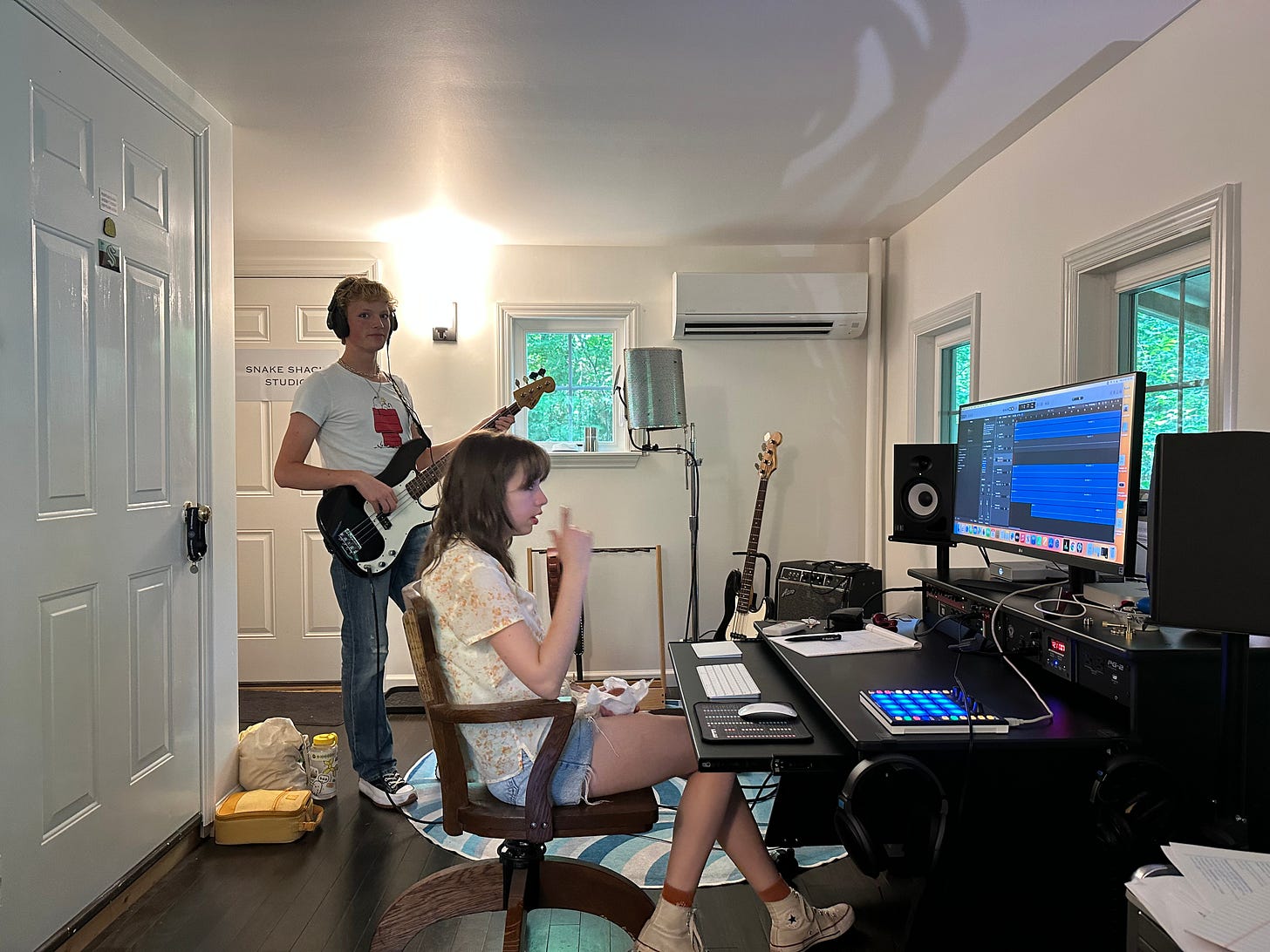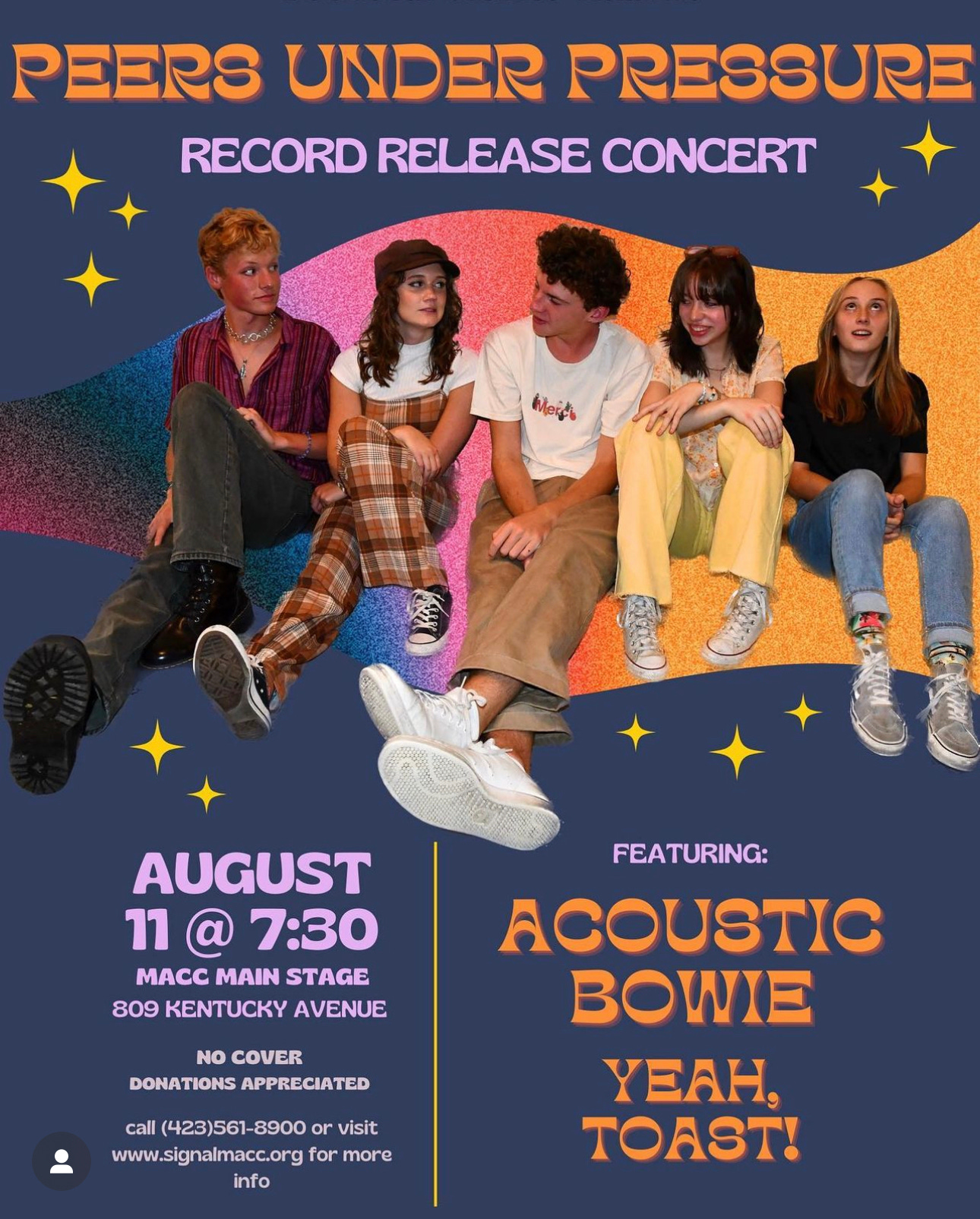The Songwriter and The Kid(S), Part II
Reverb, Reverberations, Autotune, Ch-Ch-Ch-Changes, The Opposite of Hate is a Show
One Day in July.
The kids of Peer Under Pressure are having a picnic on the floor of the rehearsal studio where, this year, their lives were changed. A local producer, accomplished and insightful, has been working with them and tomorrow they will go into a studio to record the first tracks for an EP.
They’ve just had photographs done for the album cover. They are photographs you would expect to see from a California quintet circa 1968. In one picture they are all crowded on an Ed Economy Longboard skateboard. In another they are standing in a row, four of them holding the fifth in a prone position.
In virtually every picture they are either smiling or mock frowning, the frowns made comic by the laughter in their eyes.
For a band that sounds edgy and raw like a punk band, or a little like a garage band, and a lot like an alt-rock dance band, they still can’t help but look like the kind, funny, empathetic kids that they are. It’s a winning look.
They work hard. They’ve been working with the producer a lot and they needed this day, a rehearsal and photography session, followed by a picnic, to remember that although recording music can feel like life and death, PLAYING music is almost 100% life.
In a few weeks, The Kid will tell me that they used to rehearse more songs in every rehearsal before they became such good friends. Now they tend to begin rehearsals only to be sidetracked by a riff, a joke, a possible new lyric. In short, they’ve become that rarest of things: an organically created, organically evolving, band of friends.
Peers Under Pressure has something. Their newness to everything should be a weakness, but it’s proving to be a strength. In their studio recordings they aren’t ticking off the boxes for modern music.
These days music is snapped into place as much as it is played. I don’t subscribe to the “better in my day” philosophy but I do believe the very best bands sound like they are in a room, preferably a sonically “live” room, playing with and around each other. I don’t believe in the adage “fix it in the mix.”
I especially don’t believe in Autotune, the main tool of the post 2000’s recording era.
If you’re unfamiliar with Autotune, it’s a product that arrived in 1997, a half-dozen years after the introduction of Recording Software like Pro Tools, to manipulate the pitch of instruments and voices. It was introduced to the wider public on songs like “Do You Believe” by Cher and and has become almost a generic name for any pitch correction software. Autotune can be used to make a singer with pitch issues sound better, alter a vocal track to make it sound more robotic and help blend “imperfect” harmonies.
Here’s what careersinmusic.com has to say about Autotune.
“Virtually everyone in the music industry today uses autotune, even just a little bit. It helps everything blend together by correcting any off notes that would distract the listener. It's pretty much impossible to sing perfectly in tune all of the time, so autotune is a subtle tool to tighten up a singer's performance.”
It’s pretty much impossible to sing perfectly in tune all of the time?
Maybe, but before Autotune, we had a lot of records made by perfectly amazing singers like Aretha Franklin, Otis Redding, Joni Mitchell, Stephen Stills, Gladys Knight, Smokey Robinson, and every professional opera singer. Were they pitch perfect? It didn’t matter. They were singers, not robots.
Before Autotune if you made noticeable pitch errors while recording, you had to go back and either do the entire vocal track again or, like most singers with real studio budgets, do what is called a “punch-in” where you fix the errors until you have a full usable track. That’s hard work for the singer and the engineer. But it still involves actual singing.
I’ve always sung complete tracks, and virtually always while playing the guitar. I wanted the finished product to sound as “live” as possible.
I was surprised when I got to Nashville to find out that most of the people whose music I listened to always recorded as if they would assemble the final vocal from a myriad of takes and punch-ins. This was before the days of recording with software that allowed unlimited recordings.
I was raised on soul, jazz and blues, and musicians playing together in, at most, a couple of rooms. Their instrument sounds bled into each other as the tracks were recorded.
My engineer friend Ben and I agree, a little bleed is a good thing. Bleed is what ties everything together.
I learned recently that most Bluegrass bands, the flag bearers for harmony singing, and for all instruments being recorded live by stereo microphones, are almost always using autotune during the mixing process. It makes them sound “perfect” instead of real.
That’s just wrong.
There’s no grease and dirt in those recordings.
I was listening to the Stanley Brothers iconic song “Oh, Death” and marveling at the sense of musical tightrope walking that takes place. The song crawls into your guts, precisely because of the organic and individual nature of each voice. When a record gets tied together by autotune, that kind of impact is diluted.
Most of the industry articles I read about autotune and pitch correction take the position that since everybody does it, then it has become something you are required to do just to sound “right.” But “right” is purely in the eye of the beholder.
Sound like yourself. You can’t do that with Autotune.
Autotune makes everybody a little more like everybody else. It dilutes by taking away what makes you, you.
"Why you wanna sound like him? What, you gonna be on the radio one night and yo mama won't even know it's you."- Unknown jazz cat.
Peers Under Pressure isn’t going to be diluted. The tracks are explosive, the drums recorded with organic urgency, the instruments played with equal urgency.
It’s a young band’s record. They are unlikely to know how good it is.
And it doesn’t sound like anybody else, while making you think that you’ve heard this band before.
The Kid and I have spent a day arguing about reverb. We are mixing a track and are at loggerheads about the final sound.
For what it’s worth, in 50 years of playing music, most of my arguments have been around how much and what kind of reverb to use.
The Kid and Peers Under Pressure listen to music that doesn’t even cross my path. So when they talk about sound they are speaking from a very different place than a 63 year old musician.
It has been kind of a fun argument. I see reverb as something used to separate vocals from instrumentation and make a vocal that is mixed up front feel less harsh. I never use enough to cause the vocal to fall down into the rest of the mix.
The Kid and the Mechanic, whose song we’ve been working on, see reverb as a way to bring all of the instruments and vocals into a melange of sound.
And since this is their album, that’s what how we will mix this song.
And I’m secretly happy that the Kid has her back up and won’t back down.
That’s another kind of reverb. The reverberation of your decisions. The music business tests resolve at every turn. Without a lot of backbone it can ruin every minute of your days.
The kids have backbone.
And within the next few weeks, they will have their first EP of 6 original songs, “Funky Troubles.”
It will sound different than my records, or any other record out there. It will sound like Peers Under Pressure from Signal Mountain, Tennessee.
The kids are on their way.
PLOT TWIST.
The kids are barely two weeks away from leaving the safety of the Doghouse.
Only the prodigy and the Spaniard will still be here when the school year starts.
The other three are going off to different universities.
The band will go on hiatus a few days after they play their record release show.
The EP will be available in its entirety only AFTER the band goes on an extended break.
It was the best of times, it was the worst of time.
“Turn and face the change, ch-ch-changes.”
Something about having Acoustic Bowie on their final show of this era seems appropriate.
Ziggy, The Bass Player with Two Names AKA The Bass Weasel, the Poet, The Prodigy, and guitar tech and drummer, the Metalhead, are going to be carrying on the tradition. When the kids reunite in December for their next show, there will be a new version of Acoustic Bowie.
There are other musicians waiting in the wings: The Dreamer, The Cowboy, and the Monster of Prog.
There will be more bands.
Our righteous and necessary war against hate will continue, one note and one beat at a time.

Daisy has become the official Peers Under Pressure canine representative. As The Kid says, “she’s a Pup for PUP.”
Our new family friend says you need to go to the show this Friday. It will remind you of why the world is alive with love and joy.
You will learn where you can download songs from the new EP.
You can hear original songs that have so many hooks they will deplete the stock of fish in Tennessee.
You can ask The Kid about her Telecaster with the Gold Foil pickups.
You can hear Acoustic Bowie play their first original song. Note to readers- the Poet did contribute an original song for the last show but that was officially an Axis of Dog show.
You can marvel that a 13 year old bass player anchors two bands and that a drummer who just picked up sticks this year is playing every song of the evening, with swing and drive.
You’ll get to see the debut of Kentuckycore band yeah, toast! playing the songs of the Poet and introducing a new guitarist from the Doghouse, the Philosopher.
The Philosopher will play one show and then fly to England to study all the galaxies.
Now that’s an exit!
Time will shift.
The stage will shine like a million stars.
The theater will become a universe of love and kindness.
Life will be loud.
The room will be filled with friends, parents, fans, stans, and one heartbroken, yet joyful and optimistic, old teacher.
It will be the greatest thing in the history of the world.
You can’t buy what we are selling, so the show is free.
It was the best of times, it was the worst of times.
Don’t miss it.
Love Somebody,
Nathan






